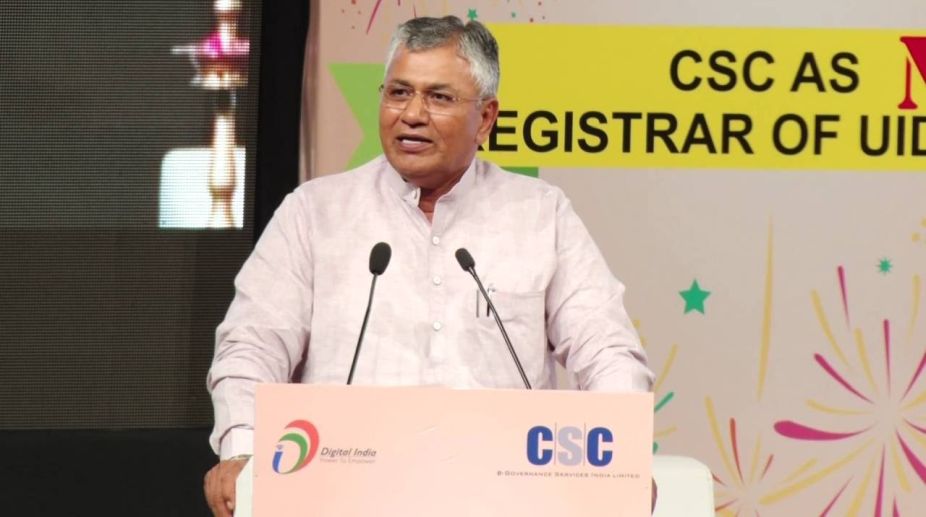Public opinion across the country in favour of Modi Govt: Yogi
The UP chief minister said under the leadership of PM Modi, India has provided the world with a model of good governance along with a secure environment in the country.

Union Minister of State for Corporate Affairs and Law & Justice PP Chaudhary was inducted into Prime Minister Narendra Modi’s Council of Ministers in July 2016. A first-time lawmaker, Chaudhary won from Pali Lok Sabha constituency in Rajasthan in 2014 by a huge margin. Before entering politics, he was a practising lawyer at the Supreme Court. After assuming charge as MoS Corporate Affairs three months ago, the minister ordered a crackdown against shell companies and erring directors, and set his focus on improving the ease of doing business. In a free-wheeling interview with ANJUL TOMAR, the suave, 64-year-old BJP leader spoke about his campaign against black money and willful defaulters in an effort to clean up the corporate environment in the country.
Q: The Ministry of Corporate Affairs (MCA) has developed an early warning system to make it easier for the government to hunt down shell companies. How does it work?
A: The MCA-21 software enables the government to identify the companies that have not filed financial statements for two consecutive years. These companies are then struck off by the Registrar of Companies (RoC) as per Section 248 of the Companies Act, 2013.
Advertisement
Q: How many companies have closed down following the clampdown by the ministry? What is the number of active companies?
A: As many as 2.25 lakh shell companies have closed down in the past three months and the hunt is still on. The action was initiated against a total of 2.91 lakh companies. Currently, the number of active companies in the country stands at 11.60 lakh.
Q: What is the extent of the violations? Have you received information from all banks on dubious accounts? What about investigations into cooperative and rural banks?
A: Investigations have been ordered wherever the deposits made post-demonetisation have been found to be suspicious. The magnitude will be known after the investigations are over. All banks have not submitted information yet. We are also awaiting details of suspicious accounts from rural and co-operative banks.
Q: A 14-member committee has been set up to review and improve the implementation of the Insolvency and Bankruptcy Code (IBC). When is it likely to give its report?
A: The Insolvency Law Committee (ILC) led by the MCA secretary has been given two months to give its recommendations to improve the functioning of the Insolvency and Bankruptcy Code. Before this, the committee will look into the issues that impact the efficiency of the corporate insolvency resolution plan and the liquidation framework.
Q: There are fears that IBC amendments will impact competitive bidding which will result in larger losses for banks. What is your opinion?
A: The amendments will make sure that viability of the plan is not impacted. The amendments have been made to prohibit unscrupulous and undesirable persons from participating in the resolution process.
Q: Why is it that promoters are allowed to bid for stressed assets in the UK and US but not in India?
A: Promoters have not been debarred from bidding for stressed assets as such. IBC restricts certain categories of persons from participating in the insolvency resolution process, including those who have not settled overdue amounts and those whose accounts have been non-performing for a year. The antecedents of such applicants may adversely impact the credibility of the resolution process under the code. In the US and UK, the shareholding is dispersed. They also have strong regimes for disqualifying directors who mismanage companies or indulge in fraudulent transactions.
Q: What are the reforms your ministry is working on in the area of starting business, where World Bank ranking has placed India at 156th position?
A: With the aim of providing ease of doing business, the ministry has simplified rules and shortened the process of starting a company. The time taken to process the incorporation application of a company and that of name availability has been reduced from 15 days to one to two days. The number of procedures and cost of starting a company have also come down as part of the reforms undertaken by the ministry. The fee for incorporating a company has been reduced from Rs 2,000 to Rs 500.
Q: You are keeping a strict vigil on the action against shell companies and directors. Recently you ordered disqualification of the directors whose companies failed to file returns. What is the number of directors failing on corporate governance front?
A: A total of 3.1 lakh directors of the companies that did not file financial statements or annual returns for three straight years have been disqualified under Section 164 (2) (a) of the Companies Act.
Q: After the recent crackdown on erring directors, industry is demanding that the government needs to make a distinction between the firms which are not regular with financial filings and those guilty of fraud. What are your thoughts?
A: Action has been taken against the directors for non-filing of annual returns. This is different from the provisions for fraud. In such cases where directors are found to have committed fraud, the provisions of Section 447 of the Companies Act apply. The person booked under it is liable for a punishment and a fine.
Q: What are your priorities after taking over as the Minister of Corporate Affairs?
A: My priorities are to provide ease of doing business and create transparency and an environment
of compliances. We are also working on the clean-up of the shell companies to curb their use for routing black money.
Advertisement